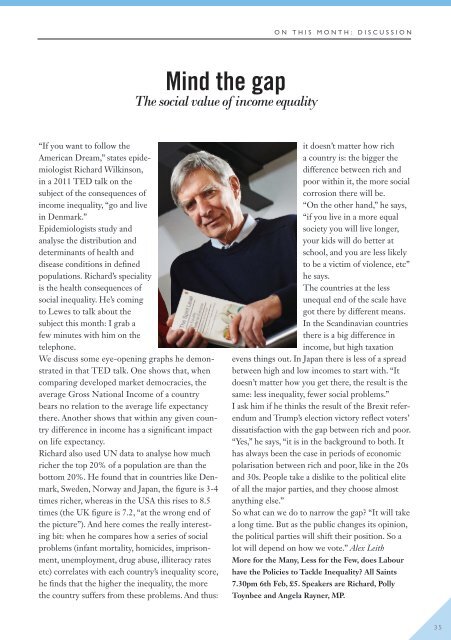Viva Lewes Issue #137 February 2018
You also want an ePaper? Increase the reach of your titles
YUMPU automatically turns print PDFs into web optimized ePapers that Google loves.
ON THIS MONTH: DISCUSSION<br />
Mind the gap<br />
The social value of income equality<br />
“If you want to follow the<br />
American Dream,” states epidemiologist<br />
Richard Wilkinson,<br />
in a 2011 TED talk on the<br />
subject of the consequences of<br />
income inequality, “go and live<br />
in Denmark.”<br />
Epidemiologists study and<br />
analyse the distribution and<br />
determinants of health and<br />
disease conditions in defined<br />
populations. Richard’s speciality<br />
is the health consequences of<br />
social inequality. He’s coming<br />
to <strong>Lewes</strong> to talk about the<br />
subject this month: I grab a<br />
few minutes with him on the<br />
telephone.<br />
We discuss some eye-opening graphs he demonstrated<br />
in that TED talk. One shows that, when<br />
comparing developed market democracies, the<br />
average Gross National Income of a country<br />
bears no relation to the average life expectancy<br />
there. Another shows that within any given country<br />
difference in income has a significant impact<br />
on life expectancy.<br />
Richard also used UN data to analyse how much<br />
richer the top 20% of a population are than the<br />
bottom 20%. He found that in countries like Denmark,<br />
Sweden, Norway and Japan, the figure is 3-4<br />
times richer, whereas in the USA this rises to 8.5<br />
times (the UK figure is 7.2, “at the wrong end of<br />
the picture”). And here comes the really interesting<br />
bit: when he compares how a series of social<br />
problems (infant mortality, homicides, imprisonment,<br />
unemployment, drug abuse, illiteracy rates<br />
etc) correlates with each country’s inequality score,<br />
he finds that the higher the inequality, the more<br />
the country suffers from these problems. And thus:<br />
it doesn’t matter how rich<br />
a country is: the bigger the<br />
difference between rich and<br />
poor within it, the more social<br />
corrosion there will be.<br />
“On the other hand,” he says,<br />
“if you live in a more equal<br />
society you will live longer,<br />
your kids will do better at<br />
school, and you are less likely<br />
to be a victim of violence, etc”<br />
he says.<br />
The countries at the less<br />
unequal end of the scale have<br />
got there by different means.<br />
In the Scandinavian countries<br />
there is a big difference in<br />
income, but high taxation<br />
evens things out. In Japan there is less of a spread<br />
between high and low incomes to start with. “It<br />
doesn’t matter how you get there, the result is the<br />
same: less inequality, fewer social problems.”<br />
I ask him if he thinks the result of the Brexit referendum<br />
and Trump’s election victory reflect voters’<br />
dissatisfaction with the gap between rich and poor.<br />
“Yes,” he says, “it is in the background to both. It<br />
has always been the case in periods of economic<br />
polarisation between rich and poor, like in the 20s<br />
and 30s. People take a dislike to the political elite<br />
of all the major parties, and they choose almost<br />
anything else.”<br />
So what can we do to narrow the gap? “It will take<br />
a long time. But as the public changes its opinion,<br />
the political parties will shift their position. So a<br />
lot will depend on how we vote.” Alex Leith<br />
More for the Many, Less for the Few, does Labour<br />
have the Policies to Tackle Inequality? All Saints<br />
7.30pm 6th Feb, £5. Speakers are Richard, Polly<br />
Toynbee and Angela Rayner, MP.<br />
35


















